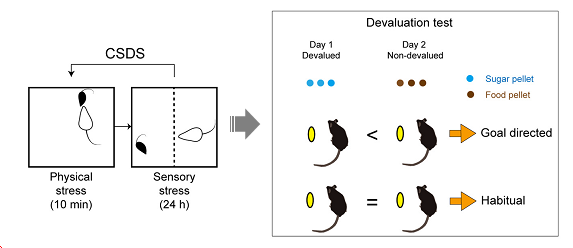
A team of researchers recently has found that exposing male mice to social defeat stress, a mimicry of chronic stress, tended their behavior toward the habitual behavior rather than goal-directed one.
Dr. LIANG Jing from the Institute of Psychology, together with collaborators at University of Chinese Academy of Sciences, discovered that this alteration in the behavior could be regulated to the normal state utilizing corticotropin-releasing factor (CRF) receptor of type 1 (CRFR1) placed within the infralimbic (IL) region of prefrontal cortex (PFC). Results were published in Progress in Neuropsychopharmacology & Biological Psychiatry on Feb. 2.
PFC is part of brain responsible for the cognitive and executive functions. Among the PFC sub-regions, IL has been shown to be responsible for modulating the habitual behavior. On the other hand, CRF system, seems to be candidate number one for adjusting the impairments caused by different types of stress stimuli both within the brain and body.
"According to our devaluation test, mice previously exposed to chronic stress didn't care about how they could get the reward," said Dr. LIANG.
In devaluation test, animals were trained to get reward (food or sugar) in a fixed ratio or variable intervals by poking their nose on a fixed spot. The results from her lab displayed a habitual attitude in stressed mice.
Interestingly, they found that this impairment could be treated and turned back to the goal-directed behavior using CRFR1 antagonist, NBI 27914. It seems that NBI 27914 regulates the CRFR1 activity. In this situation, goal-directed behavior, as was previously impaired by chronic stress, displays syndrome of normal mice in the sense of choice and decision-making.
The findings in this study are not the final stage for controlling the decision-making. Yet it still is a great milestone in this matter and can give the feature scientists more ideas about the stress therapy, especially the ones impact on decision-making.
This study was supported by grants from the Ministry of Science and Technology of the People’s Republic of China, the National Natural Science Foundation of China, the Natural Science Foundation of Beijing Municipality and the CAS-VPST Silk Road Science Fund 2021.

Social defeat treatment and decision-making test. (Image by Dr. LIANG Jing)

86-10-68597521 (day)
86-10-68597289 (night)

86-10-68511095 (day)
86-10-68512458 (night)

cas_en@cas.cn

52 Sanlihe Rd., Xicheng District,
Beijing, China (100864)

